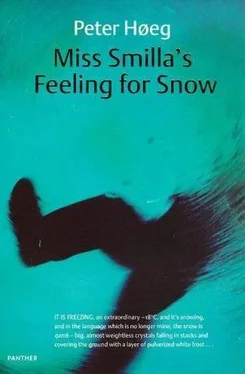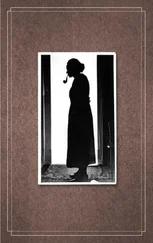Peter Høeg - Smilla's Sense of Snow aka Miss Smilla's Feeling for Snow
Здесь есть возможность читать онлайн «Peter Høeg - Smilla's Sense of Snow aka Miss Smilla's Feeling for Snow» весь текст электронной книги совершенно бесплатно (целиком полную версию без сокращений). В некоторых случаях можно слушать аудио, скачать через торрент в формате fb2 и присутствует краткое содержание. Жанр: Современная проза, на английском языке. Описание произведения, (предисловие) а так же отзывы посетителей доступны на портале библиотеки ЛибКат.
- Название:Smilla's Sense of Snow aka Miss Smilla's Feeling for Snow
- Автор:
- Жанр:
- Год:неизвестен
- ISBN:нет данных
- Рейтинг книги:3 / 5. Голосов: 1
-
Избранное:Добавить в избранное
- Отзывы:
-
Ваша оценка:
- 60
- 1
- 2
- 3
- 4
- 5
Smilla's Sense of Snow aka Miss Smilla's Feeling for Snow: краткое содержание, описание и аннотация
Предлагаем к чтению аннотацию, описание, краткое содержание или предисловие (зависит от того, что написал сам автор книги «Smilla's Sense of Snow aka Miss Smilla's Feeling for Snow»). Если вы не нашли необходимую информацию о книге — напишите в комментариях, мы постараемся отыскать её.
Smilla's Sense of Snow aka Miss Smilla's Feeling for Snow — читать онлайн бесплатно полную книгу (весь текст) целиком
Ниже представлен текст книги, разбитый по страницам. Система сохранения места последней прочитанной страницы, позволяет с удобством читать онлайн бесплатно книгу «Smilla's Sense of Snow aka Miss Smilla's Feeling for Snow», без необходимости каждый раз заново искать на чём Вы остановились. Поставьте закладку, и сможете в любой момент перейти на страницу, на которой закончили чтение.
Интервал:
Закладка:
It swings inward. In the doorway stands Elsa Lübing. She takes her time looking me over.
"Well," she says finally, "you are certainly persistent." She steps aside. I walk past her into the apartment.
She and the building share the same coloring, polished silver and fresh cream. She is quite tall, almost six feet; and she is wearing a long, simple, off-white dress. She has put up her hair, but several loose locks fall like a cascade of shiny metal over her cheeks. No makeup, no perfume, and no jewelry other than a silver cross at her throat. An angel. The kind you can trust to guard something with a flaming sword.
She looks at the letter I stuck through the door. It's Juliane's pension award.
"I remember this letter quite well," she says.
There's a painting on the wall. From the heavens, down toward the earth, flows a stream of long-bearded patriarchs, fat little children, fruit, cornucopias, hearts, anchors, royal crowns, cannons, and a text you can read if you know Latin. This picture is the only sign of luxury. Other than that, the room has bare white walls, a parquet floor with wool carpets, an oak desk, a low, round table, a pair of high-backed chairs, a sofa, a tall bookcase, and a crucifix.
Nothing else is needed. Because there is something else here. A view that only a pilot would normally see, tolerable only if you don't suffer from vertigo. The apartment seems to consist mainly of one very large, bright room. Over by the balcony, along the entire width of the room, there is a wall of glass. From there you can see all of Frederiksberg, Bellahøj, and, in the distance, Høje Gladsaxe. The light of the winter morning comes in through the window, as white as if we were outside. On the other side there is another large window. From there you can see the spires of Copenhagen, across an endless expanse of rooftops. High above the city, Elsa Lübing and I stand as if in a bell jar, trying to size each other up.
She offers me a hanger for my coat. Spontaneously I slip off my shoes. Something about the room demands it. We sit down in two high-backed chairs.
"This time of day," she says, "I am normally in prayer."
She says this as naturally as if she were usually in the middle of the heart association's exercise program at this time of day.
"So-unbeknownst to you-you have chosen an inconvenient time," she says.
"I saw your name on the letter and looked you up in the phone book."
She looks at the paper again. Then she takes off her thick-lensed reading glasses.
"A tragic accident. Especially for the child. A child needs both parents. That is one of the practical reasons why marriage is sacred."
"Mr. Lübing would be pleased to hear that."
If her husband is dead, I'm not insulting anyone. If he's alive, it's a tasteful compliment.
"There is no Mr. Lübing," she says. "I am the bride of Jesus."
She says this in a manner both serious and coquettish, as if they had been married a few years ago and the relationship is still happy and looks as if it will last.
"But that does not mean that I do not regard love between men and women as holy. It is, however, only a stage along the way. A stage that I have permitted myself to skip, so to speak."
She gazes at me with something that looks like sly humor. "Like skipping a grade in school."
"Or," I say, "like going directly from bookkeeper to chief accountant at the Cryolite Corporation of Denmark."
When she laughs, her laughter is as resonant as a man's.
"My dear," she says, "are you married?"
"No. Never have been."
We move our chairs closer together. Two mature women who both know what it's like to live without men. She seems to be managing better than I am.
"The boy is dead," I say. "Four days ago he fell off a roof."
She gets up and goes over to the glass wall. If you could look that dignified and that good it would be a pleasure getting old. I drop the idea at the mere thought of having to grow another foot.
"I met him once," she says. "When you met him you understood why it is written that unless you become as children, you will not enter Paradise. I hope his poor mother will find her way to Jesus."
"Only if you can find Him at the bottom of a bottle." She looks at me without smiling. "He is everywhere. Even there."
In the early sixties the Christian mission in Greenland still had some of the quivering vigor of imperialism. More recent times-especially at Thule Air Base-with their containers full of porno magazines and whiskey and the demand for semi-prostitution, have left us on the outskirts of religion in a vacuum of wonder. I have lost the sense of how to tackle a believing European.
"How did you meet Isaiah?"
"I used my modest influence within the corporation to increase the contact with Greenlanders. Our quarry in Saqqaq was a restricted area, just like the Øresund Cryolite Corporation's quarry in Ivittuut was. The workers were Danish. The only Greenlanders we hired were on the cleaning staff, the kivfaks. From the day the mine opened, a strict separation had been maintained between Danes and Inuits. In this situation I tried to draw their attention to the commandment `Love thy neighbor.' Every few years we would hire Inuits in connection with geological expeditions. It was on one of these that Isaiah's father died. Even though his wife had left him and their child, he had continued to contribute to her support. When the board of directors awarded the pension, I invited her and the child to my office. That's where I saw him."
Something about the word "award" gives me an idea. "Why was the pension granted? Was there a legal obligation?"
She hesitates for a moment. "There was probably no obligation. I cannot rule out that they were influenced by my advice."
I see yet another side of Miss Lübing. Power. Maybe that's the way it is with angels. Maybe a certain pressure was put on Our Lord in Paradise, too.
I go over to join her at the window. Frederiksberg, the neighborhood around Genforenings Square, Brønshøj, the snow makes everything look like a village. Hejre Road is short and narrow. It runs into Due Road. On Due Road there are many parked cars. One of them is a blue Volvo 840. The products of the Volvo factories do get around. They would have to, in order for the company to afford sponsoring the Europe Tour. And to pay the fee my father boasts that he demanded for his photograph.
"What did Isaiah's father die of?"
"Food poisoning. You are interested in the past, Miss Jaspersen?"
At this point I have to decide whether I'm going to feed her some phony story or take the more difficult route with the truth. On the low table is the Bible. One of the Greenlandic catechists at the Moravian mission's Sunday school was obsessed with the Dead Sea Scrolls. I remember his voice as he said, "And Jesus said: `Thou shalt not lie.' " I let that thought be a warning.
"I think something scared him, that someone was chasing him up on that roof he fell from."
Her equanimity does not waver even for a second. The last few days I've been meeting people who view with the greatest calm the things that surprise me the most.
"The Devil assumes many forms."
"It's one of those forms that I'm searching for."
"Vengeance is mine, saith the Lord."
"That kind of justice is too long-term for me."
"It was my understanding that for the short term we have the police."
"They've closed the case." She stares at me.
"Tea," she says. "I haven't even offered you anything to drink."
On her way out to the kitchen she turns around in the doorway.
"Do you know the parable of the talents? It's about loyalty. There is a loyalty toward the worldly as well as the heavenly. I was an official of the Cryolite Corporation for forty-five years. Do you understand?"
Читать дальшеИнтервал:
Закладка:
Похожие книги на «Smilla's Sense of Snow aka Miss Smilla's Feeling for Snow»
Представляем Вашему вниманию похожие книги на «Smilla's Sense of Snow aka Miss Smilla's Feeling for Snow» списком для выбора. Мы отобрали схожую по названию и смыслу литературу в надежде предоставить читателям больше вариантов отыскать новые, интересные, ещё непрочитанные произведения.
Обсуждение, отзывы о книге «Smilla's Sense of Snow aka Miss Smilla's Feeling for Snow» и просто собственные мнения читателей. Оставьте ваши комментарии, напишите, что Вы думаете о произведении, его смысле или главных героях. Укажите что конкретно понравилось, а что нет, и почему Вы так считаете.




![Рута Шепетис - Ashes in the Snow [aka Between Shades of Gray]](/books/414915/ruta-shepetis-ashes-in-the-snow-aka-between-shades-thumb.webp)







